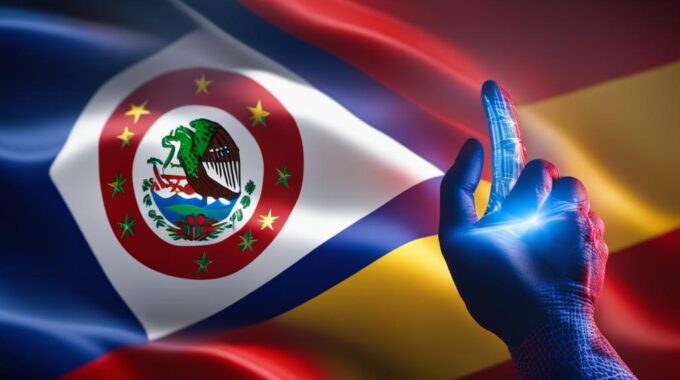As a hub for international workers and service providers, Costa Rica has introduced Law No…

Costa Rica Fingerprinting for Residency Guide With CRIE.cr
The path to residency in the idyllic nation of Costa Rica begins with a process integral to ensuring the safety of this tropical community—fingerprinting. The Costa Rica immigration fingerprinting system is a cornerstone of the nation’s security measures, necessitating precise coordination and assistance for hopeful applicants. Fortunately, Costa Rica Fingerprinting Services stand at the ready to streamline this critical aspect of the residency application.
When embarking on the journey to obtain a fingerprinting for Costa Rica residency permit, it is paramount to engage with experts familiar with the nuanced requirements. With the professional acumen of Costa Rica Immigration Experts (CRIE), maneuvering through the complexities of fingerprinting services in Costa Rica transforms from daunting to manageable.
Completing the Costa Rica residency application fingerprinting is not just a procedural step; it’s an affirmation of an applicant’s intent to contribute positively to Costa Rican society. CRIE’s mastery in facilitating fingerprinting for residency in Costa Rica ensures that each individual navigates this portion of the application with confidence and ease.
Aspiring residents will find that engaging with CRIE is a strategic move, one that smoothest the route to establishing a new chapter in Costa Rica. The detailed, proficient support provided is testament to CRIE’s commitment to making the residency application process as straightforward as possible.
Key Takeaways
- Costa Rica’s immigration system prioritizes community safety, mandating fingerprinting for all residency applicants.
- Professional assistance from CRIE is invaluable for convenient and accurate Costa Rica residency application fingerprinting.
- The fingerprinting stage is a critical security checkpoint within the broader fingerprinting for residency in Costa Rica process.
- CRIE offers unparalleled experience in navigating fingerprinting for Costa Rica residency permit procedures.
- Resources and comprehensive guidance for fingerprinting services in Costa Rica are readily available through CRIE’s website.
Understanding the Importance of Fingerprinting for Costa Rica Residency
Securing residency in the vibrant country of Costa Rica includes a crucial step that upholds the integrity of its immigration system: fingerprinting. This process not only helps in establishing a person’s identity but is also vital for legal and security verification. Adeptly managing this aspect of the residency application, Costa Rica Immigration Experts (CRIE) plays an instrumental role in assisting applicants to seamlessly navigate the Costa Rica fingerprinting process. Let’s delve deeper to understand why fingerprinting is paramount in confirming eligibility for Costa Rica residency.

Key Role of Fingerprinting in the Residency Process
Mandatory for those aged 12 and over, the Costa Rica residency fingerprints requirement is not just a formal procedure but a substantive measure to strengthen community safety. The fingerprints of applicants are carefully checked against national and international databases, thereby confirming identity and conducting a comprehensive legal background assessment. This step ensures that new residents are trustworthy individuals who can positively contribute to the safety and security of the nation.
Compliance with Costa Rica Residency Requirements
For would-be residents, the key to a successful application lies in meticulous compliance with Costa Rica fingerprinting requirements. This involves preparing and presenting documents such as criminal background checks and consular registration. Failure to meet these stringent requirements can lead to delays or even denials in the residency process. It is, therefore, critical to understand and meet the financial, legal, and documentary prerequisites mandated by Costa Rican immigration authorities.
How CRIE.cr Facilitates your Fingerprinting Endeavors
Effectively managing the intricacies of obtaining Costa Rica residency fingerprints is no simple task. CRIE comes to the aid of applicants by providing personalized guidance throughout the entire procedure. From scheduling the Costa Rica residency fingerprinting appointment to advising on the Costa Rica residency fingerprinting fees, CRIE’s expertise streamlines the process. CRIE ensures that all stages of the process, from document preparation to verification, are executed flawlessly, reflecting their dedication to the applicants’ success.
| Requirement | Description |
|---|---|
| Passport-sized photographs | Applicants must provide recent photographs that comply with the specific requirements for residency applications. |
| Completed application forms | All relevant forms must be accurately filled and submitted in the Spanish language. |
| Fingerprint registration | A compulsory step for applicants, ensuring their prints are registered with the appropriate Costa Rican authorities. |
| Apostilled/legalized documents | Required documents such as birth certificates and criminal record checks must be suitably apostilled or legalized. |
By assisting in the fingerprinting for immigration purposes, CRIE places applicants on a clear path toward fulfilling their aspirations of residing in Costa Rica. The professional and methodical support offered by CRIE ensures that the Costa Rica fingerprinting process becomes an efficient and less daunting step in the journey towards residency.
Costa Rica Fingerprinting for Residency: The Step-by-Step Procedure
Embarking on the residency application in Costa Rica involves an intricate sequence of actions, with the fingerprinting process for residency being a vital component. This process ensures not only compliance with the immigration laws of Costa Rica but also reinforces the security of this nation’s residents. Below is a comprehensive breakdown of the steps involved in fingerprinting for residency permit and fingerprinting for permanent residency in Costa Rica.

The fingerprinting for immigration purposes in Costa Rica can begin only after the applicant has gathered all necessary documentation and fulfilled the initial requirements of the residency application in Costa Rica. The following enumerated list details the procedural steps applicants can expect to encounter:
- Seek guidance from experienced professionals such as Costa Rica Immigration Experts (CRIE) to understand the intricacies of the process.
- Complete and notarize all required personal documents, including the apostille of your birth certificate and criminal records.
- Translate pertinent documents into Spanish, as required by Costa Rican authorities.
- Register your fingerprints officially, a critical step for applicants over the age of 12.
- Prepare passport-sized photographs adhering to the specifications for the residency application.
- Complete and verify the official residency application forms provided by the Costa Rican government.
- Schedule the fingerprinting appointment through the designated Costa Rican channels.
- Attend the fingerprinting appointment, bringing all necessary documents and identification.
- Wait for the processing of fingerprints and subsequent residency application approval.
- Stay updated with the application status and comply with any additional requests from the immigration office.
Success in the fingerprinting process for residency is anchored in the thorough preparation and accurate submission of required materials. An essential component of preparation includes understanding the documents necessary for your appointment:
| Document Type | Specifications | Importance |
|---|---|---|
| Identification Documents | Valid passport or ID, along with apostilled/legalized birth certificate | Verifies the applicant’s identity and nationality |
| Criminal Background Check | Apostilled/legalized and translated, reflecting recent history | Ensures applicant does not pose a security risk |
| Financial Records | Supporting documents proving financial stability | Confirms the applicant’s ability to sustain themselves financially |
| Proof of Fingerprint Registration | Official documentation confirming fingerprints have been recorded | Integral part of the residency validation process |
Fulfilling these criteria meticulously is imperative for a smooth progression through the fingerprinting for residency in Costa Rica. Prospective residents are encouraged to proactively manage each stage, an endeavor that becomes much more manageable with the expert support from organizations such as CRIE.
In conclusion, while the fingerprinting for residency permit in Costa Rica may be viewed as a formal requirement, its execution is critical to the integrity of the Costa Rican immigration structure. The process, when correctly followed, exemplifies an applicant’s commitment to legally integrating into the Costa Rican community, setting a foundation for a worry-free life in this paradisiacal locale.
Conclusion
Navigating the Costa Rica residency process is akin to piecing together a puzzle with precision and exceptional attention to detail, ensuring adherence to each regulatory requirement. The importance of a comprehensive background check for residency in Costa Rica, merged with meticulous Costa Rica residency fingerprint services, create the blueprint for a successful application. This is where the expertise of professionals becomes invaluable, particularly those at CRIE, who are adept at simplifying and streamlining the fingerprinting process for Costa Rica residency.
Why Professional Guidance is Crucial for Costa Rica Residency Applications
Seeking the seasoned eye of professionals is not just recommended; it is paramount for those entangled in the complex web of Costa Rica residency application process. Fingerprinting, acting as both a symbolic and actual safeguard of the nation’s immigration solidarity, demands a level of proficiency that is frequently beyond the scope of individual experience. Costa Rica Immigration Experts (CRIE) is instrumental in guiding applicants through every facet—from the foundational background check for residency in Costa Rica to the critical Costa Rica fingerprinting for residency renewal—ensuring each step meets the highest of standards set forth by immigration authorities.
The Path to a New Chapter in Costa Rica with CRIE.cr’s Assistance
The coveted journey to residency involves more than filling out forms; it is a testament to an applicant’s readiness to join and respect the diverse tapestry of Costa Rica’s community. The completion of the fingerprinting process for Costa Rica residency symbolizes an integral commitment to the nation’s legal best practices and societal welfare. With the unwavering assistance and adept support from CRIE, future residents are equipped to navigate the complexity of residency requirements, leaving no stone unturned. The path to a serene life amidst Costa Rica’s rich landscapes and tight-knit communities is made clearer, positioning CRIE as an invaluable partner in this transformative life milestone.
FAQ
What exactly is Costa Rica immigration fingerprinting?
Costa Rica immigration fingerprinting is a key part of the process for applying for residency in the country. It involves taking an individual’s fingerprints to help verify their identity and conduct a thorough background check, both locally and internationally, to ensure there are no legal impediments to their residency application.
Are there specific Costa Rica fingerprinting services I should use?
The fingerprinting process is typically performed through approved and designated services by the Costa Rica immigration authorities. CRIE.cr provides professional assistance in navigating these services, ensuring that applicants fulfill this requirement correctly as part of their residency application process.
Is fingerprinting mandatory for all types of residency in Costa Rica?
Yes, fingerprinting is required for all types of residency permits in Costa Rica, whether for temporary or permanent status. This step is mandatory for all applicants over the age of 12 and must be completed to proceed with the residency application.
How does CRIE.cr facilitate the fingerprinting process?
CRIE.cr assists applicants at every stage of the fingerprinting process by providing detailed information, scheduling fingerprinting appointments, advising on the required documents, and offering support to ensure applicants meet all the residency fingerprinting requirements effectively.
What are the associated costs for Costa Rica residency fingerprinting?
The costs for fingerprinting for residency purposes in Costa Rica can vary. It includes the fees for the fingerprinting service itself and any additional costs for related services such as legal advice or assistance. CRIE.cr can provide applicants with a comprehensive breakdown of all expected fees.
How do I schedule a Costa Rica residency fingerprinting appointment?
You can schedule a fingerprinting appointment by contacting the appropriate Costa Rican government agency or by working with CRIE.cr, which can handle the appointment scheduling as part of their services to streamline the residency application process.
Can I undergo fingerprinting for Costa Rica residency renewal?
Yes, fingerprinting is also a requirement when renewing your residency in Costa Rica. Any individual seeking to renew their residency status must undergo the fingerprinting procedure again, as part of the residency renewal process.
Are there any exceptions to the fingerprinting requirement for Costa Rica residency?
In general, all applicants seeking residency in Costa Rica are required to be fingerprinted. However, in certain specific and exceptional circumstances, which are usually determined on a case-by-case basis, there might be exemptions. For accurate information regarding unique situations, it’s advised to consult with CRIE.cr or the relevant Costa Rican authorities.
What is the role of fingerprinting in the overall Costa Rica residency application process?
Fingerprinting plays a critical role in verifying the identity of the applicant and ensuring their background aligns with the legal requirements set forth by Costa Rican immigration law. It is one of the essential security measures adopted by authorities to maintain the safety and integrity of the country.


